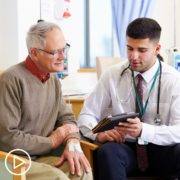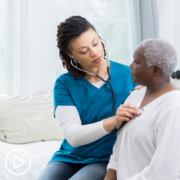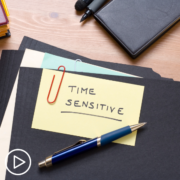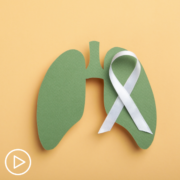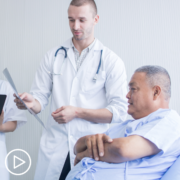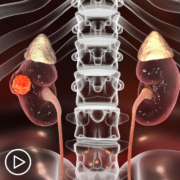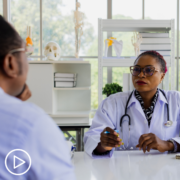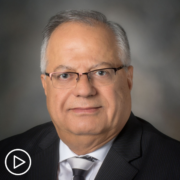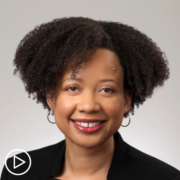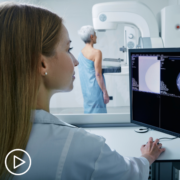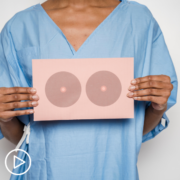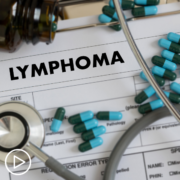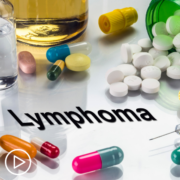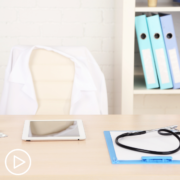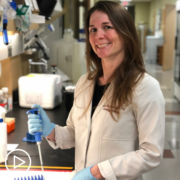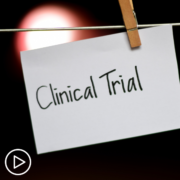Considering a Myelofibrosis Clinical Trial? Questions You Should Ask
Considering a Myelofibrosis Clinical Trial? Questions You Should Ask from Patient Empowerment Network on Vimeo.
What questions should patients ask when considering a myelofibrosis clinical trial? Expert Dr. Gabriela Hobbs discusses how clinical trials may fit into a treatment plan and shares key questions to ask your healthcare team about participation.
Dr. Gabriela Hobbs is a hematology-oncology physician specializing in the care of patients with myeloproliferative neoplasms (MPN), chronic myeloid leukemia and leukemia. Dr. Hobbs serves as clinical director of the adult leukemia service at Massachusetts General Hospital. Learn more about Dr. Gaby Hobbs.
See More from Evolve Myelofibrosis
Related Resources:

Myelofibrosis Clinical Trial Participation | How Does It Move Research Forward? |

|
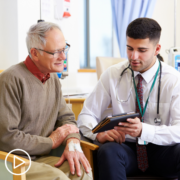
Evolving Myelofibrosis Treatment Options: What You Should Know |
Transcript:
Katherine:
So, where do clinical trials fit into a treatment plan?
Dr. Hobbs:
So, it really depends on what is available at the site where you’re seeking care. Clinical trials come in a variety of different flavors. So, there may be a clinical trial for patients that are newly diagnosed, that are about to start a JAK inhibitor, for example.
So, if you’re a patient that’s considering a JAK inhibitor to treat your spleen symptoms or your systemic symptoms, and there happens to be a clinical trial for adding on another medication, like the first JAK inhibitor you receive, well, that’s a great place to consider a clinical trial.
There may also be clinical trials in later lines. Let’s say you were treated only with a JAK inhibitor first, but the study that’s available at your center is adding another medication to the JAK inhibitor if the JAK inhibitor by itself didn’t quite do the trick.
There’s also other studies, for example, at the time of transplantation, for example, using the JAK inhibitors during transplant. So, really the clinical trials can be relevant at any time during treatment. In addition to clinical trials, testing new medications, there’s also other ways to participate in research throughout your time as a patient with your care team, which may include things like, for example, consenting to participate in a tissue bank.
You donate a sample of your blood or bone marrow that is then later on used for research. Or we may have studies investigating the symptoms a patient has throughout their disease or their experience living with their disease. So, there’s many different ways of participating in research and clinical trials, even if those don’t necessarily include trying a new medication.
Katherine:
What questions should patients be asking if they’re interested in learning more about clinical trials?
Dr. Hobbs:
Yeah, great question. So, the first is understanding, you know, what is the medication that you will be receiving? Are you going to be receiving a placebo? Is that an option? This means a sugar pill. That’s a common question that I get. How do you get assigned to different groups? So, in one trial, there may be a group that gets one dose, another group that gets another dose, et cetera. So, it’d be important to know how are you going to get assigned and what are the options potentially for you before you sign up.
After that, it’s important to know what phase the study is in. So, is this a first-in-human study where your doctor may not be able to tell you a whole lot about what’s expected in terms of side effects or safety or toxicity? Or is this a Phase III study where maybe the trial has been open for many years and there’s been many patients that have been enrolled in it already? Or maybe this is a drug that’s already been approved for another condition and we’re borrowing it for myelofibrosis, for example, and then your care team can tell you lots of information about the safety and toxicities, etc.
So, having a sense of where the drug is in its development, I think can be very helpful. Then there are some practical things that we sometimes do not spend enough time talking about.
So, I’m glad to have the space to talk about that here. Participating in a clinical trial takes time. And it’ll take more time as a patient to participate in a clinical trial than to receive regular care. You may have to go to the hospital where you’re being treated more frequently. If you’re somebody that receives virtual care where some of your visits are telehealth and some of them are in person, you need to be aware that you may have more visits that are in person because the clinical trial procedure requires that certain labs or tests be done in the facility, not anywhere else. Clinical trials by definition, unfortunately, sometimes have to be very inflexible in order to ensure that we collect data in a uniform way.
So, just being aware that it may take more time to participate is important. And along those lines, asking if the clinical trial will reimburse you for some of that time. So, for example, if you need to park in the expensive hospital parking more frequently, some trials will actually reimburse you for that. Or they may offer a hotel reimbursement if you need to travel from far away and spend a night there. So, don’t be afraid to ask those things because many times that’s built into the clinical trial.
So, that’s an important thing just practically to know. So, asking for a study calendar so you get a sense of how frequently you’ll need to be going to the doctor is really important. Also, then realizing that potentially you may have to go to see the doctor or the care team more frequently initially, but then after the first couple of months, if everything is going well, you’ll likely have the flexibility to go less often. So, all those questions are important to have in mind.





